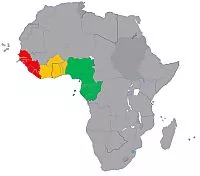WHO: Budget and Planning Minister- Udo Udoma; Nigeria Debt Management Office.
WHAT: Nigeria is in talks with China's Exim Bank to secure a loan of US$21 billion to finance the 2016 budget and embark on massive infrastructure development.1 The 2016 budget of the populous African country has a funding gap of about US$11.1 billion which needs to be bridged.
In April this year, Nigeria secured a US$6 billion loan from the Chinese government to finance infrastructure in the 2016 budget.2 Already, Nigeria owes the same bank about US$1.8 billion. According to Nigeria's Debt Management Office, external debt currently stands at US$10.9 billion while domestic debt stands at US$44 billion.3
WHY: Nigeria's economy has been hit by a shortfall in government revenue mainly due to a plunge in crude oil prices on the international market-the main source of government revenue, and reduction in crude oil production because of militant attacks in the Niger Delta among other domestic factors.
Nigeria's currency has been depreciating steadily since the change in exchange rate regime from fixed to flexible in June this year. The currency is currently trading around N395 to a US dollar compared with N195 in 2015.
WHEN: This was made known at the Forum on China-Africa Cooperation (FOCAC) implementation and follow-up action plan in China in early August. In December 2015, China pledged to support Africa with US$60 billion for three years at FOCAC held in South Africa.
OUTLOOK: It is likely that the Exim Bank will grant Nigeria the loan if proper management mechanisms are put in place to manage the funds. If the loan is granted, Nigeria will be able to finance key infrastructure projects which will spur economic growth. With a shortfall in government revenue and a possible economic recession, securing the Exim Bank loan will bring some relief to Nigeria's economy.
Acquiring a US$ 20 billion loan from China will increase public debt stock drastically which could plunge the nation into debt distress if amortization schedules are breached. If Nigeria fails to secure the loan, earmarked infrastructure projects for this year will not see the light of day. Economic recession will be all the more likely if crude oil prices stay low and also if attacks on oil pipeline installation continue.
Footnotes
1 http://www.africareview.com/business-finance/Nigeria-seeks-additional-loan-from-China/979184-3344610-grifpmz/index.html
2 http://www.thisdaylive.com/index.php/2016/04/13/nigeria-offered-6bn-chinese-loan-agrees-currency-swap-to-shore-up-naira/
3 http://www.africareview.com/business-finance/Nigeria-seeks-additional-loan-from-China/979184-3344610-grifpmz/index.html
The content of this article is intended to provide a general guide to the subject matter. Specialist advice should be sought about your specific circumstances.



